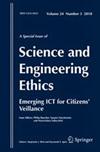通过机器学习支持可信的人工智能
IF 3
2区 哲学
Q1 ENGINEERING, MULTIDISCIPLINARY
引用次数: 0
摘要
机器学习(MU)经常从如何促进 "被遗忘权 "的角度进行分析。在这篇评论中,我们表明机器学习可以支持经合组织(OECD)的可信人工智能五项原则,这些原则正影响着全球的人工智能发展和监管。这使它成为将人工智能原则转化为实践的一个有前途的工具。我们还认为,实施人工智能并非没有道德风险。为了解决这些问题并扩大 MU 的积极影响,我们提出了六类政策建议,以鼓励研究和采用这项可能极具影响力的新技术。本文章由计算机程序翻译,如有差异,请以英文原文为准。
Supporting Trustworthy AI Through Machine Unlearning
Machine unlearning (MU) is often analyzed in terms of how it can facilitate the “right to be forgotten.” In this commentary, we show that MU can support the OECD’s five principles for trustworthy AI, which are influencing AI development and regulation worldwide. This makes it a promising tool to translate AI principles into practice. We also argue that the implementation of MU is not without ethical risks. To address these concerns and amplify the positive impact of MU, we offer policy recommendations across six categories to encourage the research and uptake of this potentially highly influential new technology.
求助全文
通过发布文献求助,成功后即可免费获取论文全文。
去求助
来源期刊

Science and Engineering Ethics
综合性期刊-工程:综合
CiteScore
10.70
自引率
5.40%
发文量
54
审稿时长
>12 weeks
期刊介绍:
Science and Engineering Ethics is an international multidisciplinary journal dedicated to exploring ethical issues associated with science and engineering, covering professional education, research and practice as well as the effects of technological innovations and research findings on society.
While the focus of this journal is on science and engineering, contributions from a broad range of disciplines, including social sciences and humanities, are welcomed. Areas of interest include, but are not limited to, ethics of new and emerging technologies, research ethics, computer ethics, energy ethics, animals and human subjects ethics, ethics education in science and engineering, ethics in design, biomedical ethics, values in technology and innovation.
We welcome contributions that deal with these issues from an international perspective, particularly from countries that are underrepresented in these discussions.
 求助内容:
求助内容: 应助结果提醒方式:
应助结果提醒方式:


